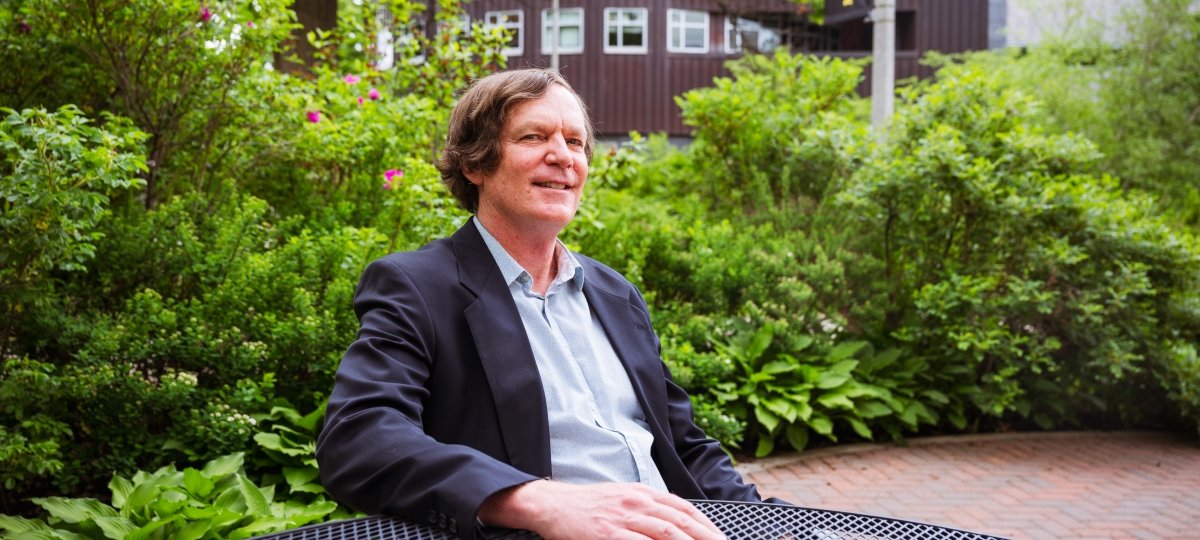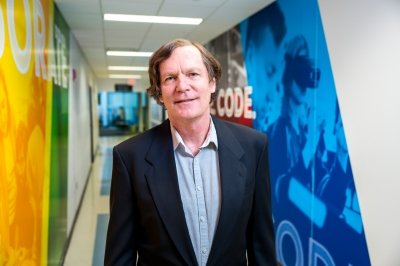Charles Wallace is the recipient of Michigan Technological University’s 2024 Distinguished Teaching Award in the Associate Professor/Professor category.
Charles Wallace is a professor of computer science and serves as the associate dean for curriculum and instruction in Michigan Tech’s College of Computing. He studied linguistics at the University of Pennsylvania and the University of California before earning his Ph.D. in computer science from the University of Michigan. His diverse experiences as a computer scientist, linguist and software developer drive his research on improving human understanding, construction and usage of software. His work has received funding from the National Science Foundation, Google, Microsoft Research and the U.S. Department of Defense.
Since joining Michigan Tech in 2000, Wallace has played a key role in undergraduate computer science curriculum development, co-founding the software engineering bachelor’s degree program in 2003. He has also initiated significant computer education and literacy outreach programs for local middle and high school students and older community members.
"The Distinguished Teaching Award could have been designed with Chuck specifically in mind; his collective accomplishments in teaching, research and community building are individually impressive, and downright astounding when taken together."
Q: What does this recognition mean to you personally and professionally?
CW: Michigan Tech has a long and rich tradition of talented and committed teachers, and being included among the group of previous awardees is a tremendous honor. At the same time, I realize that any individual success I may have is based on a foundation of excellent teaching by my colleagues, as well as the good faith and hard work of my students. And I have adopted pedagogical ideas from four friends of mine who are profoundly thoughtful educators: Briana Bettin, Alex Morrison, Kelly Steelman and Leo Ureel. All of these people deserve bits of this award.
Q: Can you share some insights into your approach to teaching and how it has changed over the years?
Distinguished Teaching Award
Since 1982, the annual Michigan Tech Distinguished Teaching Award has been awarded in two categories: Associate Professor/Professor and Teaching Professor/Professor of Practice/Assistant Professor. The award nomination and review processes are student-driven; finalists are selected based on student ratings regarding quality of instruction. Winners receive $2,500 and a plaque at an awards dinner sponsored by the Office of the President in the fall.
CW: I have always had an aversion to the “sage on the stage” approach; I never liked it as a student, and I hate it when I drone on for too long in class. I do my best to build in interactive moments even in traditional lectures. The think-pair-share approach is something I use in just about every lecture. I am also a fan of small group work. I believe that students can learn quite a lot from each other, and that the peer discussion and mentoring that takes place in a well-functioning small group provides opportunities for them to reinforce their own understanding. In my discipline of computer science, teamwork is a vital professional competency that we need to practice as much as possible. But it’s important not to simply throw students together and hope for the best; groups need to be nurtured and encouraged.
Over the years, I have gained a greater appreciation for informal learning outside the classroom. I have created opportunities for students to learn by teaching through two outreach programs, each with over a decade of success. BASIC (Building Adult Skills in Computing) pairs students with digitally marginalized residents of our local community, helping them build competence and confidence. In Copper Country Coders, students design and lead classes in computer science and programming for middle and high school students in our community. Face-to-face with learners with different backgrounds and special needs, students in these programs solidify their understanding of core concepts by having to articulate them, and they gain an appreciation for users of technology who are not like them.
Q: What do you think makes for a successful learning experience?
CW: The learning scientist Lev Vygotsky conceived of the Zone of Proximal Development: the range of tasks that a learner can accomplish with appropriate support. For him, this is where true learning takes place. If a learner stays within the realm of what they can already do unaided, stagnation sets in and they make no progress. At the other extreme, attempting tasks that they cannot accomplish even with substantial help just results in frustration. I see my job as an educator as providing students with opportunities to explore their Zone of Proximal Development. To do this, I design exercises that push students a bit out of their comfort zone, making myself available as their guide all along the way. For some students, this is an entirely new approach, and they’re not sure what to make of it. So I do my best to cultivate a learning environment where struggling with problems is a source of pride, not shame; where asking questions is the norm, not the exception; and where everyone in the class, not just me, is a potential teacher.
Q: Are there any particular teaching methods or techniques that you find especially effective in helping students grasp complex concepts in your field?
The Ethical Cycle
As presented in Michigan Tech elective course HU3710 Engineering Ethics, the Ethical Cycle provides a foundation for students to learn about ethics in engineering and computing disciplines. Developed by philosophers Ibo van de Poel and Lambèr Royakkers, the cycle features an operational model with well-defined stages:
- Statement of the moral problem
- Analysis
- Identification of options for action
- Ethical evaluation
- Reflection
CW: In my computing ethics class, I ask my computer science and software engineering students to look critically at the digital technology that they are becoming experts in. Critical thinking of this nature can be at odds with the practice of software design: working incrementally in a series of refinements toward a “solution.” Understanding the consequences of digital technology on humans and the world requires a broader view, where every “solution” has implications that need to be explored, and the path of critical inquiry may be messier than the iterative code design they are more familiar with. To give them some needed structure, I have adapted the Ethical Cycle framework for discerning and evaluating moral actions through iterations of broad analysis followed by reflection and synthesis. I augment the Ethical Cycle process with periodic interventions that engage students in dialogue with one another, with the instructor and with domain experts. The design of these exercises, with varied opportunities for discussion with a variety of interlocutors, provides a scalable way of engendering meaningful discourse within large classes.
Another innovation I’ve adopted lately is in my graduate Theory of Computation course. It involves some sophisticated mathematical ideas, and it’s fair to say that most students would not choose to take it if it were not a required course. I realized that the 2.5 hours of lecture time per week was not enough — more time was needed for working through problems. I started a tradition of informal, optional Friday afternoon recitation sessions in the graduate lounge. It’s a different vibe from the lecture: We’re in comfortable chairs, it’s the end of the week, and I have a constant supply of Finnish candies at hand. I facilitate the discussion but encourage the students to provide most of the words. I’ve noticed that over the course of the semester, I end up talking less and less: The students take charge and have discussions with one another. It’s a beautiful thing to watch.
Q: Who (or what) inspired you to become a teacher?
CW: My K-12 education was an unbelievable run of one superheroic teacher after another. These role models seemed to me to be doing the most important and enjoyable work anyone could possibly do. Some gave me well-needed critiques of my work and showed me how to improve it. Others gave me the confidence to be myself and speak with my own voice. And others practiced benign neglect by setting me up with dangerous materials and letting me do what I wanted with them. One teacher — who also taught me about art, poetry and math — showed up at school one day in 1979 with an Apple computer and said, “Charlie, why don’t you figure out what this thing can do?” We spent several years writing educational games, and I was hooked — on both computing and education.
Q: Could you share a memorable teaching moment or success story that stands out to you in your career?
CW: Some computer science students have convinced themselves that they are “Coders,” not “Math People.” “Non-Math-Person” has almost become part of their identity. But mathematics is really a form of careful dialogue that one can become conversant in through repeated practice. I love it when students work hard with me through the semester, coming to office hours and recitations, and the hard work finally pays off. Given the disruptive and somewhat chaotic advent of computing into our lives, I think it’s particularly important for my students to have that experience of careful reading, writing and reasoning — and that they feel capable of doing it on their own.
Q: What opportunities does this award open up for you?
CW: I suppose awards have an awareness-raising effect, and I certainly appreciate connecting with like-minded educators. If anyone reading this interview finds any of the ideas interesting, I hope that they will reach out to me. I think that “teaching excellence” is often given a magical aura, that it’s somehow wrapped up intrinsically in the personality of the teacher — but it’s really about replicable practices, and I hope that the award can provoke some good conversations about creating and developing best practices.
Michigan Technological University is an R1 public research university founded in 1885 in Houghton, and is home to nearly 7,500 students from more than 60 countries around the world. Consistently ranked among the best universities in the country for return on investment, Michigan's flagship technological university offers more than 120 undergraduate and graduate degree programs in science and technology, engineering, computing, forestry, business, health professions, humanities, mathematics, social sciences, and the arts. The rural campus is situated just miles from Lake Superior in Michigan's Upper Peninsula, offering year-round opportunities for outdoor adventure.







Comments